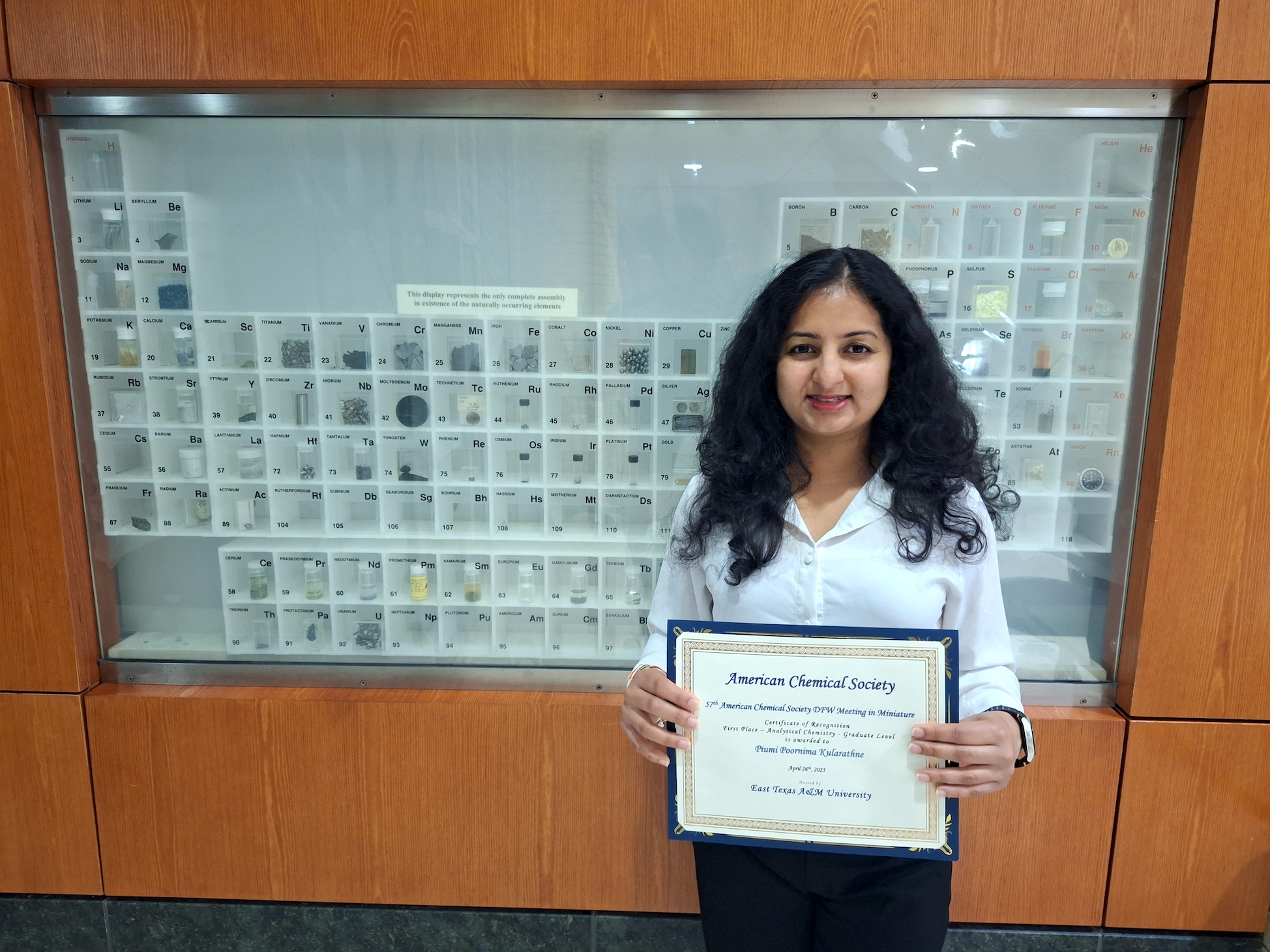Piumi Poornima Kularathne is a chemistry graduate student currently in her second year of doctoral work at UNT. Piumi is pursuing her research in Analytical Chemistry under the guidance of Dr. Francis D’Souza, who was recently honored with the UNT Foundation Eminent Faculty Award.
Meet Piumi Poornima Kularathne, a chemistry graduate student currently in her second year of doctoral work at UNT. Piumi is pursuing her research in Analytical Chemistry under the guidance of Dr. Francis D’Souza, who was recently honored with the UNT Foundation Eminent Faculty Award.

“My current research work involves the production of ammonia via electrocatalysis,
focusing on designing and synthesis of electrocatalyst using a wide variety of advanced
techniques,” said Piumi, who earned high undergraduate honors in Environmental Science
from the University of Peradeniya, one of the most prestigious universities in Sri
Lanka.
Ammonia has numerous industrial and commercial uses, primarily as fertilizer and in
the production of other chemicals. It is also used in refrigeration, water purification,
and as a cleaning agent, and is increasingly used in energy storage applications.
“Worldwide, ammonia production is mainly based on a century-old process called Haber-Bosch process, which has several disadvantages,” explained Piumi. “It consumes a large amount of
energy, primarily derived from fossil fuels, making it a major contributor to greenhouse
gas emissions and climate change. My current research seeks an approach to ammonia
production that is cost effective, green, and sustainable."
With Dr. D’Souza’s Analytical Chemistry Research Group, Piumi has hands-on experience with multiple electrochemical and analytical instruments.
“Our lab is very well-equipped and the high-end research infrastructure at UNT supports
high-quality, cutting-edge experimentation,” she said.
Piumi was one of thirty-three UNT chemistry students who recently presented their
research at the 2025 American Chemical Society DFW Section Meeting-in-Miniature, and
was pleased to receive a first-place award for her research presentation.
“I always strive to give my best in research, and this award reminds me that hard
work truly does pay off,” said Piumi. “It gave me confidence that my research is meaningful
and motivates me to keep working hard. It also adds value to my academic profile and
helps when applying for scholarships or fellowships. I believe it shows not only the
quality of my research but also my ability to communicate science clearly.”
At UNT, Piumi is an active member of the Sri Lankan Students Organization and has
been involved in many student organizations and extracurricular activities throughout
her academic career. Her advice to fellow students working on similar research and
academic goals is to trust the process and be sure to also do things that “keep your
soul alive.” For her, this means embracing her musical passions as well as her scientific
dreams.
“I’ve been singing and playing the violin since I was very young, and I studied Hindustani
classical music through formal training,” said Piumi, who holds two Visharad degrees,
equivalent to a graduate-level qualification in Indian classical music. “I am proud
to have been the youngest Visharad in Sri Lanka the age of fourteen. Music especially
has been something that keeps me calm, focused, and motivated. I believe all these
experiences, both creative and academic, have helped shape who I am today, as a person
and as a researcher.”
Piumi is looking forward to taking important steps in her Ph.D. journey in the coming
year, with the goal of completion in 2028.
“I’ll be taking my qualifying oral exam in the Fall, which is a big milestone for
me. I’m also excited to present my research at the ACS Fall 2025 National Conference
in Washington, D.C in this August. It’s a great chance to share my work and connect
with other scientists,” she said. “My long-term goal is to gain strong experience
through my Ph.D. and then contribute my research skills to an industry setting, where
I can use what I’ve learned to make a real difference.”